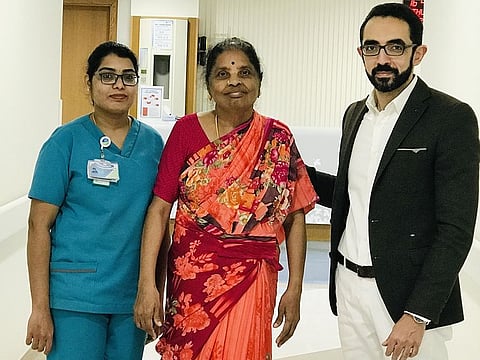Complex medical procedure handled for first time in UAE by Zulekha Hospital Dubai tackles highly calcified coronary lesions
Hospital tackles highly calcified coronary lesions using new version of shockwave therapy

The skilled cardiology team at Zulekha Hospital, Dubai, renowned for its unwavering commitment to providing optimal care for high-risk cardiac patients, has achieved a significant milestone in cardiac intervention. Last month, Dr Mohamed Shehata, Consultant Interventional Cardiologist, successfully treated a high-risk female Indian patient, Kasthuri Damodaran Manickam, who presented at the hospital with acute myocardial infarction.
Manickam, with a known history of ischemic heart disease and a previous coronary angioplasty 12 years prior, was admitted following complaints of acute chest pain. Coronary angiography revealed the presence of an almost completely blocked right coronary artery with extensive calcification. Calcification is deposition of calcium in blood vessel walls that happens with severe long lasting atherosclerosis. Atherosclerosis (thickening or hardening of the arteries caused by a buildup of plaque in the inner lining of an artery), results from uncontrolled risk factors such as high cholesterol and high blood pressure. Calcified coronary arteries pose a formidable challenge to interventional cardiologists due to the resistance of calcium deposits to conventional intervention equipment used during procedures.
Dr Shehata, utilising the innovative approach of intravascular lithotripsy therapy, successfully restored vessel patency by deploying a single stent. The procedure marked a groundbreaking moment as it utilised the latest version of the shockwave device, the C2+, for the first time in the UAE. This advanced device facilitates the safe breakdown of calcifications using specific sonic waves, overcoming the hurdles posed by heavily calcified lesions.
"The successful outcome of Manickam's procedure underscores the efficacy of our advanced techniques and technologies in addressing complex cardiac conditions," states Dr Shehata. "The utilisation of intravascular lithotripsy therapy with the new shockwave device represents a significant advancement in our ability to manage highly calcified coronary lesions."
Following the procedure, Manickam was discharged safely and gratified, with post-procedural precautions emphasising adherence to long-term medications, including aspirin, and strict control of risk factors such as high cholesterol and hypertension.
Dr Shehata emphasises the importance of tight control of risk factors in preventing severe calcifications and subsequent coronary blockages. He further advised, "Maintaining a healthy lifestyle, including a balanced diet, regular aerobic exercise, and routine check-ups, plays a pivotal role in preserving heart health and preventing cardiovascular complications."
Sign up for the Daily Briefing
Get the latest news and updates straight to your inbox



